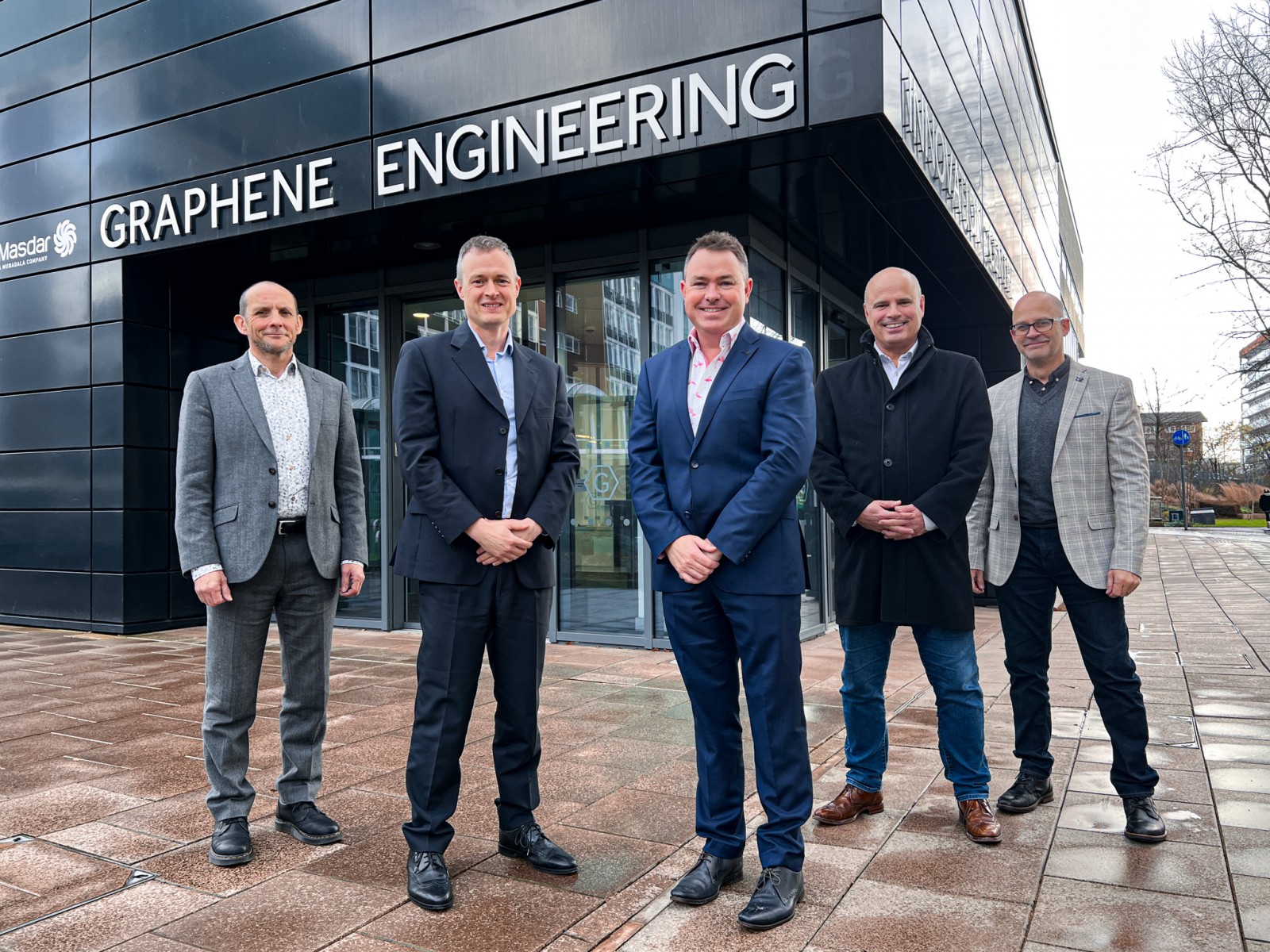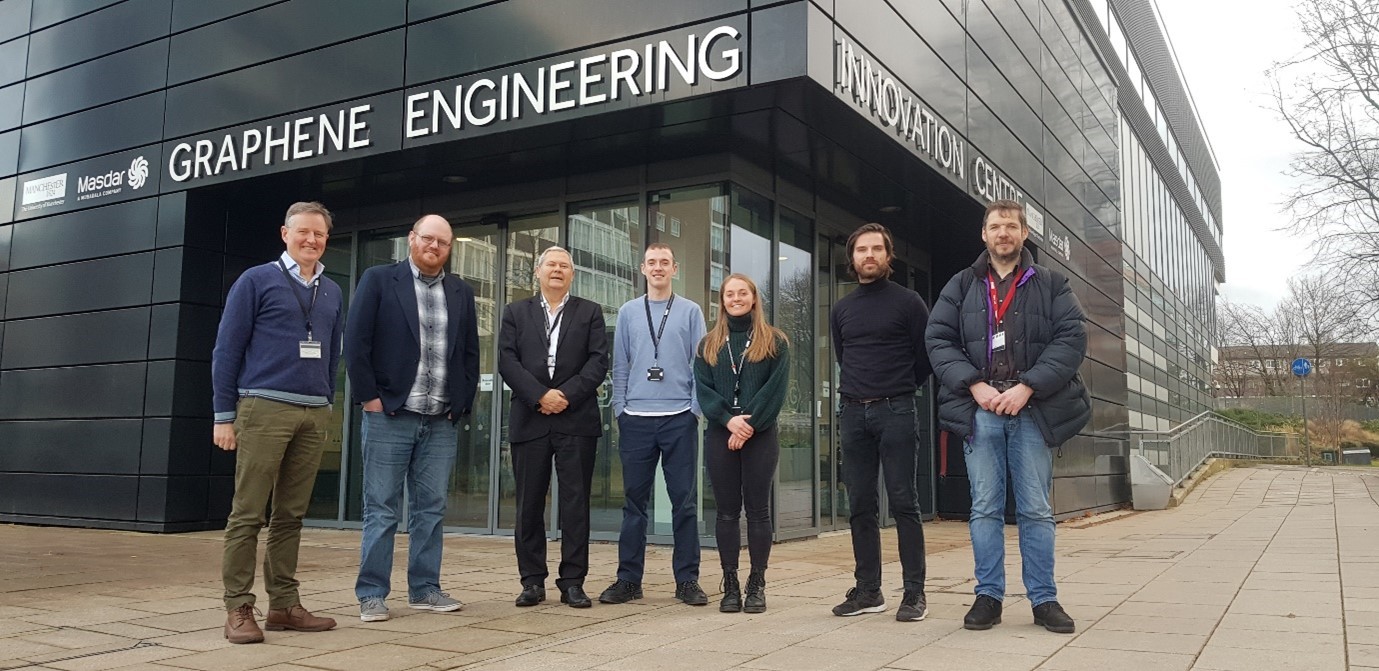Insights
GEIC signs NERD as Tier 1 partner for sustainable construction tech to accelerate innovation
The University of Manchester’s Graphene Engineering Innovation Centre (GEIC) has signed a Tier 1 agreement with Nationwide Engineering Research & Development (NERD). The agreement will extend the ecosystem of key industrial partners working collaboratively on graphene and 2D material commercialisation at the University.
NERD is a standalone company, spun out from Nationwide Engineering Group, formerly Tier 2 partners of the GEIC and responsible for the initial development of Concretene, a graphene-enhanced admixture for concrete that saves significantly on CO2 emissions and overall project costs.
In December, NERD announced funding of £8m from venture capital firm Local Globe to help drive the programme of research and development required to bring Concretene to full commercial use.
The new Tier 1 agreement provides for use of a dedicated lab within the Masdar Building, state-of-the-art concrete testing facilities and access to the unrivalled academic and engineering expertise in nanomaterials housed at The University of Manchester, the home of graphene.
Co-founder of NERD Alex McDermott is a civil engineering graduate of the University and is excited about his return to North Campus to deliver what he hopes will be the start of a new generation of sustainable construction materials.
Alex McDermott says, “I’m a Manchester lad from Failsworth and I did my degree here, so it’s great to be back and helping to design solutions for an industry that urgently needs to decarbonise”
“We’re looking to build on the work we’ve already done with the GEIC in lab trials and real-world projects and take Concretene on to the next stage of full commercial rollout. There’s still a journey to go on – R&D in this area is challenging – but the partnerships we’re building with the University and with high-profile industry clients give us the best chance of success.”
James Baker, CEO of Graphene@Manchester, said: “We have been working with Nationwide Engineering from the very beginning to help develop Concretene – and therefore delighted to welcome NERD to the GEIC as a Tier 1 partner. This is an important milestone in this ambitious project and one we can all be very proud of.
“In the past 18 months, we have rapidly gone from lab to pilot stage – and then scaled up to create ‘living labs’, including a pioneering pour just outside the GEIC. But we are still at a relatively early stage along the road to commercialisation.
“This new Tier 1 partnership will greatly help Concretene achieve its full potential to deliver a game-changing material to help us build more sustainably in the future – we look forward to taking this programme to the next stage of delivery.”
NERD envisions a three-year journey to the roll-out of Concretene to the wider construction industry, alongside technical partner Arup – the globally renowned provider of engineering and design services for the built environment – and leading infrastructure bodies including Heathrow and Manchester Airports, Network Rail, National Highways and the Nuclear Decommissioning Authority.
These early adopters will see immediate benefits through reductions in embodied carbon, while assisting in the programme of laboratory work and large-scale field trials that will ultimately prove the reliability and reproducibility needed for successful commercial deployment of Concretene.
Matthew Lovell, Director at Arup, said: “Continued innovation in the production of concrete and leaner design techniques are needed to support the construction industry’s journey towards net zero carbon emissions.
“Arup is extremely interested in Concretene’s potential to support transformative change in the built environment. Imagine what concrete with both enhanced engineering performance and substantially reduced carbon impact could contribute to our industry.”
Professor Bill Sampson, Chief Scientific Officer, GEIC, said: “I’m delighted to see Nationwide joining the GEIC as a Tier 1 partner. I look forward to working with them, with the support of academic colleagues from across the University’s Faculty of Science and Engineering, to better understand and deliver the full potential promised by graphene-enhanced cementitious materials.”

The Growth Company launches first-of-its-kind online tool to measure growth potential
The Growth Company has joined forces with Red Flag Alert, a pioneering data intelligence platform – to develop a first-of-its-kind, online tool to measure growth potential, designed with policymakers, commissioners, business decision-makers and analysts in mind.
Named ‘Growth Flag’, the online tool was launched at the Convention of The North 2023, hosted at Manchester Central and was the headline sponsor of the convention.
Growth Flag pulls live data from a comprehensive dataset – that is easily analysed by the user – to instantly present clear visuals and downloadable data. This quickly shows where growth potential exists in individual businesses across the UK.
The system is objective and evidence-based, not driven by pre-disposed assumptions as to where growth should take place. You can analyse it by postcode area, town, local or combined authority, sector or type of business. It reveals that growth takes place where you may not expect it.
The Growth Company felt that it was important to have a simple and reliable way to identify growth as it’s essential for people, businesses, and places to thrive, especially during the economic uncertainty we’re experiencing today.
The partnership to deliver Growth Flag consolidates Red Flag Alert’s background in data insights, with The Growth Company’s 30+ years of experience delivering economic and business growth. With more than 55 years of combined experience, and the scope of supporting over 30,000 businesses in the UK through Growth Flag.
Growth Flag is aimed at public sector organisations such as Local and Combined Authorities, Local Enterprise Partnerships, as well as colleges and universities. These organisations can all use the platform to understand their local economy and use it to support sectors and companies that have the highest growth potential.
It’s also hoped that the online tool will be used to inform policymaking, investment strategies and bids – and in the case of educational establishments – curriculum development and academic research.
Private sector businesses can use Growth Flag to understand emerging markets and target relevant sales and marketing activity and offer tailored solutions based on where clusters of businesses are on their growth journey.
Growth Flag provides a sound basis for your business development strategy whether you are public sector, a college or university, or B2B sales. It enables you to deliver targeted sales and marketing campaigns, so you can reach potential new customers based on where they are on their growth journey with bespoke products and solutions.
Growth Flag takes comprehensive firm-level data sets that are constantly updated to create a Growth Potential Score.
This score is then analysable at different geographic levels and by sector, size and type of business, via a user-friendly, online platform. The analysis can be presented in different formats and individual company data is downloadable for onward use by research and delivery colleagues.
The score is also based on a set of evidenced drivers of growth, not simply whether they have received investment. It provides a broader look across both frontier and foundational sectors of the economy, giving you a comprehensive and deeper understanding of your local geography.
Growth Flag can facilitate improved strategy development and resource allocation based on a comprehensive and objective understanding of businesses’ growth potential. It provides tables, graphs or GIS interface – which can be shared instantly and provides quick exportable key contact data for targeting and delivery.
It reduces the need to look across different business data sources and lists, giving you quick access to potential new clients utilising the very latest cloud technology to integrate with new systems and analytical tools, and allows users to quickly manipulate, export and share the most up-to-date business lists.
Growth Flag has a methodology involving a ten-year time frame, 150 data attributes and bespoke algorithms – using robust principal components and multivariate analysis to provide individual company potential growth scores.
Richard Jeffery, National Director, GC Business at The Growth Company explains,
“We’ve established an incredibly important partnership to create Growth Flag. We’ve brought together Red Flag Alert’s tech-data capabilities with The Growth Company’s deep knowledge and understanding of what the economic community and local and combined authorities need. We’ve created something really unique.
“It will help you unlock huge opportunities in your local area – to find those companies that have got growth potential and be future stars. But it’s not just at the company level that’s going to be interesting. When you start to look at groups of businesses, you start to understand the dynamics of a place and perhaps find growth where you’ve not found or looked for it before. It’s a game changer and something that will absolutely drive change in economic development.”
Richard West, Managing Director of Red Flag Alert says
“I’m driven by a passion for data that makes a difference, and I’ve grown Red Flag Alert from a team of three to a multi-million-pound organisation powered by a hand-picked team of #databosses. I know from experience that the right analytics and insights can create – and change – conversations, while helping to solve some of the key challenges that businesses face day in, and day out.
“Together with The Growth Company, I’m proud to have created an online tool that’s different to other growth analysis tools on the market. Growth Flag isn’t like other business intelligence platforms – it treats data as a treasure which deserves better than being labelled as a boring business need. Many other systems claim to provide real-time data on growth potential, but Growth Flag does so much more than just churn out numbers.
“I’m confident that Growth Flag will be invaluable in helping to make decisions based on rich data and understanding of real economic drivers – effectively helping to target resources and allocate funding in the best possible way using trusted data.”
Caroline Cain Head of Account Management & Client Engagement at The Growth Company’s Business Growth Hub’s Relationships & Place team says,
“Our client engagement teams at The Business Growth Hub in Greater Manchester have been using Growth Flag to target new clients. Unlike other toolkits we have used, Growth Flag predicts the growth event rather than tells us that it has already happened, therefore allowing us to intervene and offer support to maximise the potential for the benefit of the business and the region.
“It’s certainly showing us some surprises about where growth is happening in Greater Manchester – it’s challenging us to engage with new clients and gives us the intelligence to flex our messaging depending on the Growth Score of the business.”
To find out how it can help you, visit the Growth Flag website: https://growthflag.com/
For more information about Red Flag Alert, you can visit their website.

Insurance Company Canopius to Launch Tech and Data ‘Hub’ in Manchester creating 65 jobs
An insurance company plans to launch a new technology and data hub in Manchester city centre.
Canopius Group (Canopius), a global speciality (re)insurer, is set to open the Canopius Tech & Data Hub at WeWork, St Peter’s Square.
The letting, which was brokered by global real estate adviser Colliers, will ensure that the brand can continue its momentum in providing the best possible technology and data services while improving its presence in Greater Manchester and the North West.
The Hub will begin operating in early 2023. It will also support Canopius’ strategic goals to become a “future-focused” business prioritising innovation. The North West regional establishment will result in the creation of up to 65 by the end of 2024 and this will include several new technology-focused roles at Canopius.
Patrick Kennedy, associate director for UK regional flexible workspace at Colliers, said: “Manchester is the second largest UK centre for financial services and is home to many talented data and technology professionals, making it the ideal location to launch Canopius’ Tech & Data Hub.
“WeWork’s offering will create the perfect home in terms of quality of the working environment and additional amenities both on-site and within the nearby vicinity, whilst supporting the software brand’s growth plans.”
Kate Roy, group chief operating officer at Canopius, said: “Canopius has been making significant strides within the technology and data field over the past few years, and the creation of the Hub is the latest example of our investment in our digital capabilities.
“The establishment of this new location aligns with Canopius’ recent commitment to focus on technology and data and to make it a central part of our offering. I am very much looking forward to the opening of the Hub and being able to work collaboratively with the team in Manchester.”

Manchester spin-out revolutionising water filtration gets £500,000 funding boost to scale up
Molymem, a spin-out company based at The University of Manchester that is developing a breakthrough water filtration technology, has secured SEED equity investment of £500,000 to help scale up.
The business utilises the benefits of new materials in the membrane industry to create both greener and cheaper water filtration solutions.
Molymem, has a mission to enable cleaner water supplies for the world’s growing demand. It has developed an energy-efficient and highly versatile membrane coating based around a material called modified molybdenum disulphide (MoS2) to create an innovative water filtration solution.
The technology comes from research led by Professor Rob Dryfe and Dr Mark Bissett, at The University of Manchester, working in partnership with innovation experts at the University’s Graphene Engineering Innovation Centre (GEIC).
This team has used a two-dimensional version of MoS2, part of which is a natural crystal with physical properties that are complementary to those of graphene, the world’s first 2D material, originally isolated at The University of Manchester.
Molymem and its filtration application has been awarded an investment funding package of £500,400. Among the private sector investors are Cambridge Angels, Manchester Angels and NorthInvest.
Ray Gibbs, Chairman and Director at Molymem, said this new funding would enable the company to scale up and deliver on its mission. He said: “New 2D materials for membranes are needed to improve sustainability, accessibility and tackle one of the world’s greatest problems – delivering clean fresh water for all.”
“The application of 2D advanced materials into water filtration technologies will, we are confident, help provide solutions to this critical global challenge.”
Working with businesses and utility companies Molymem has coated a variety of membrane systems and tested the rejection of various salts and other organic molecules, such as nitrates. The performance is equal to or better than existing commercial solutions – but at much lower cost, making the Molymem system a ‘greener and cheaper’ option.”
Dr Mark Bissett Chief Scientific Officer (Molymem Limited), Reader in Nanomaterials, Dept. of Materials (University of Manchester) commented “It’s incredibly exciting to see our technology, which was developed here in the labs at the University of Manchester as a fundamental research project, be successfully spun out into a company and receiving this funding. Going forward I look forward to seeing our technology have real commercial impact and see our products improving sustainability in multiple industries.”
Richard Lydon, a leading filtration expert and senior advisor to Molymem explained: “Access to clean fresh water is one of the greatest problems we face in the world. Factors that impact on the availability of clean water include climate change, water quality, pollution, and population growth.
“At the same time, water and wastewater treatment plants across the world need to be upgraded to keep pace with legislation and the ever-growing demand for drinking water. This unique technology is an added value to existing membrane systems reducing particulate ‘clogging’ of the current filter, enabling improved life, reducing the use of chemicals and increasing flux (water flow). The Molymem platform is robust in any environment and can be tailored (through specific functionalisation of the coating) to reject target particulates such as nitrates, phosphates, PFAS/PFOS, dissolved organics, heavy metals and other pollutants, offering unique selling points to meet the needs of the water industry.”
Rajat Malhotra, Managing Partner, Wren Capital and a member of Cambridge Angels commented, “ We liked the sustainability aspect of Molymem and the strong management to apply novel technology into a significant market in need of new membranes to deal with the increasing threat of particulate pollution (especially nitrates) in the water course. We, therefore, wanted to lead a SEED funding round on behalf of Cambridge Angels who were subsequently joined by investors from Manchester Angels and NorthInvest. This first tie-up makes a strong strategic link between Manchester and Cambridge to enhance co-syndication between the investor groups and the hope of more to come.”
David Levine, Principal of Manchester Angels said: “We’re very excited to have participated in Molymem’s recent raise. Manchester Angels was established specifically to fund early-stage, game-changing technologies and technology businesses and help support levelling-up for the North.”
Jordan Dargue, Board Director of NorthInvest said: ”We were so impressed with the Molymem team’s expertise and passion. The technology is innovative and solves a real market problem so I was thrilled to be able to help the company access funding at this crucial stage. What’s more, this round of investment for Molymem is a perfect example of how angel networks can collaborate to help Northern entrepreneurs access investment. I’m so pleased for Richard and the Molymem team and look forward to seeing what the future holds. “

Manchester’s historic Campfield market buildings to become a tech hub
Two historic Manchester city centre buildings are being transformed into a hub for growing media and tech companies using £17.5m of Levelling Up funding.
Manchester City Council has entered into legal agreements with development partner Allied London for the Grade II-listed Upper Campfield Market and Lower Campfield Market buildings on Liverpool Road.
Allied London will repair, refurbish and fit out these heritage buildings to create a new Campfield tech, media and creative industries hub within St. John’s which will be operated by its managed workspace platform All Work & Social.
A third building, Castlefield House owned by Allied London, will also be repositioned as part of the master plan to provide complementary workspace for tech and media businesses.
Campfield will attract and support start-up, recovery and scale-up businesses in the tech, innovation and media sectors.
The Campfield market buildings will provide 83,000 sq. ft. of modern workspace including a minimum of 400 hot desks plus meeting rooms, event spaces and other facilities accessible on a permanent occupier or drop-in basis.
Over 15 years, an anticipated 1,600 jobs will be created and a further 2,400 jobs sustained.
The project will build on the success of the Exchange Tech Hub in the Bonded Warehouse and form part of wider plans for Enterprise City in St John’s including the ABC Building, the Globe Building, and Manchester Goods Yard which is already the home of Booking.com and Cloud Imperium Games.
Work on Campfield will be completed by spring 2024.
Council Leader and GMLEP Board Member Cllr Bev Craig said: “Campfield is an exciting initiative which will see these two heritage buildings help play a dynamic part in Manchester’s future, giving innovative businesses an affordable place to flourish and helping to create the jobs of tomorrow.
“Having a location in the heart of the city centre, as part of a cluster of similar businesses, will create an environment where tech, media and creative entrepreneurs – whether they are starting up or scaling up – can network and share inspiration.
“Manchester has always been a city of innovation and creativity. Campfield will help ensure it continues to be.”
Michael Ingall, Chairman & Chief Executive of Allied London, stated: “This project is important, firstly to get two historic buildings back into a sustainable use and, secondly, it’s a project to further develop the tech, media and creative sectors in the heart of Manchester, providing more affordable and supported infrastructure and services whilst establishing interesting public areas in the buildings for the wider community’s benefit.
“We have researched as well as visited several precedent developments such as New Lab, Brooklyn, Station F, Paris, LocHal, Tilburg, and Palermo, Uruguay, as part of our consideration for the design and what can be achieved, and are confident of delivering a very impactful project for Manchester.”
Tanya Grady, Commercial Director of All Work & Social, the managed workspace operator, said: “At Department Bonded Warehouse we have firmly established the acclaimed Exchange programme for start-ups and scale-ups where, working with Tech Nation, we have had a great number of successes in our annual cohorts. We are now in our fourth year having supported the founding and growth of over 120 fledgling businesses. Campfield will allow us to supersize the Exchange programme and provide more support services around these businesses, and we are excited to be able to build on this success.”
Campfield is one of two schemes in the Culture in the City project in which Manchester City Council was awarded almost £20m of Government Levelling Up funding in autumn 2021. The remaining £2.2m will see three heritage railway arches, between arts venue HOME and Whitworth Street West converted into a creative talent development centre to be operated by HOME. More details of this will be announced in the new year.

Digital bank Starling to create 1,000 jobs with Northern expansion into Manchester
Digital challenger bank Starling is creating up to 1,000 jobs in Manchester through the opening of its fourth UK office, highlighting the strength of the region’s fintech sector.
London-based Starling Bank was founded in 2014 by CEO Anne Boden and in March, this year, she revealed she was considering a new Northern office and was choosing between either Manchester or Leeds for the base.
Starling has selected Manchester for its next base because of its deep pool of tech talent and rich cultural and creative heritage.
The city, which has been named the UK’s Top Digital Tech City, benefits from a £5bn digital ecosystem and access to stand-out graduates from three top universities.
The region is home to some of the UK’s fastest-growing start-ups and tech giants, with five tech unicorns based in the North West and six more pending.
Now, the bank has started to recruit within Greater Manchester for roles in the business, including roles in operations, software engineering, data science, cybersecurity, and customer service.
The strategic move follows an impressive year of growth for the digital bank, which announced its first full year of profitability, reached the three million account milestone and launched Engine by Starling, the bank’s software-as-a-service offering.
Starling’s central Manchester base will open in the first half of 2023 to support the next phase of the bank’s growth as it continues to build industry-disrupting banking technology for its personal and business account customers.
Its base in Manchester will join the bank’s four current offices in London, Cardiff, Southampton and Dublin, which currently support more than 2,000 staff.
Anne Boden, CEO of Starling Bank said: “What better place to set up shop than in Manchester?
“As the world’s first industrial city, with three brilliant universities on its doorstep and a thriving technology scene, there was never any doubt that Manchester would house our first step into the North.”
Susanna Yallop, chief people officer at Starling Bank, said: “We’ve expanded our headcount by 20% this year and only continue to grow.
“Our sights are now firmly set on Manchester, where we can draw from its potential workforce of more than seven million, allowing us to grow our headcount even further with some of the North’s finest talent.”
The announcement follows Starling’s investment in Women’s football in the region, working with former and current Manchester City players Jill Scott and Lauren Hemp during the UEFA Women’s EURO 2022, and providing grants to local women’s grassroots clubs.

